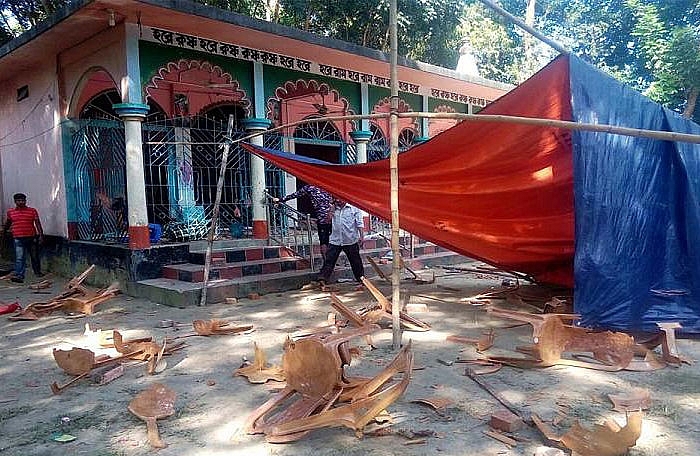Insta
Attack On Hindus In Bangladesh: Country’s Human Rights Commission Says Motive Was To Grab Land

Bangladesh residents stand near a vandalised Hindu temple in Brahmanbaria. (STR/AFP/Getty Images)
The attacks by frenzied Muslim mobs on Hindu temples, homes and men and women at Nasirnagar in Bangladesh’s eastern Brahmanbaria province earlier this week were “pre-planned” and carried out with the motive of grabbing the lands and hearth of the minority Hindus, said the country’s National Human Rights Commission (NHRC).
An NHRC team that visited the affected area on Wednesday (2 November) said that two Islamist bodies, the Touhidi Janata and Ahle Sunnat Wal Jamaat, triggered the protests after rumours circulated that a young Hindu man posted some pictures of a Hindu deity at Mecca. The NHRC team was accompanied by a six-member team of Nagorik (citizens') committee led by prominent rights activist Sultana Kamal and a ten-member team of Bangladesh Hindu-Buddhist-Christian Oikya Parishad led by its general secretary Rana Dasgupta.
An NHRC member, Enamul Hoque Chowdhury, told reporters after the visit that since the attacks on Hindus took place simultaneously at different locations, they would have been pre-planned. “The simultaneous attacks on Hindus was certainly a planned one like the ones during the 1971 Liberation War,” said Chowdhury, adding that the motive was to grab lands belonging to the Hindus by intimidating them.
Chowdhury said thieves and dacoits patronised by organisers of the protest rallies in Brahmanbaria looted valuables from Hindu temples and homes. The NHRC and two other bodies demanded a judicial probe into the incidents and to determine the role of the police and local administration. The local police and administration not only remained passive during the arson and violence, but some officials are reported to have made incendiary speeches and instigated the crowds.
The local member of Parliament and country’s fisheries minister, Muhammed Sayedul Hoque, has also attracted flak for downplaying the attacks. The minister made it a point not to visit the riot-affected areas and homes of the Hindus.
Minorities in Bangladesh have been facing attacks, and many have been killed, since 1947. Even after 1971, the attacks and killings have continued, and reports suggest that attacks are often orchestrated to dispossess the minorities of their movable and immovable properties.
Bangladesh’s Islamists have found a host of excuses to attack, kill and loot minorities. In 2013, for instance, Muslim mobs destroyed 50 Hindu temples and 1,500 Hindu homes in 20 provinces across the country after the International Crimes Tribunal sentenced a senior Jamaat-e-Islami functionary to death for his involvement in the 1971 war crimes. The Jamaat and its virulent students’ wing, the Islami Chatra Shibir, were blamed for the attacks.
In 2014, after the Awami League swept the national polls that was boycotted by the opposition Bangladesh Nationalist party (BNP) and its ally, the Jamaat-e-Islami, Hindu homes and business establishments were attacked by BNP and Jamaat activists all over the country.
The number of Hindus living in Bangladesh has been steadily declining. As this report by the Vivekananda International Foundation reveals, the percentage of Hindus was 22 per cent in 1951 (the first census after the partition in 1947) in East Pakistan while Muslims were 76.9 per cent. The 1961 census found the percentage of Hindus to be 18.5 per cent (Muslims increased to 80.4 per cent). The next census in 1974 (after the formation of Bangladesh) found the Hindu population in the country drop to 13.5 per cent. This figure came further down to 10.5 per cent in 2011 and to 8.5 per cent in the last census in 2011, while the percentage of Muslims increased to 90 per cent in 2011.
Today, Hindus would constitute about 7.5 per cent of the population of Bangladesh.
Introducing ElectionsHQ + 50 Ground Reports Project
The 2024 elections might seem easy to guess, but there are some important questions that shouldn't be missed.
Do freebies still sway voters? Do people prioritise infrastructure when voting? How will Punjab vote?
The answers to these questions provide great insights into where we, as a country, are headed in the years to come.
Swarajya is starting a project with an aim to do 50 solid ground stories and a smart commentary service on WhatsApp, a one-of-a-kind. We'd love your support during this election season.
Click below to contribute.
Latest